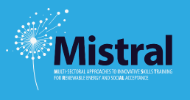About MISTRAL

MISTRAL background
-
We are at the beginning of a global transition to a low carbon economy that will fundamentally change society’s relationship with energy and result in major shifts in economic, social and technological organisation
-
Onshore wind energy is now the cheapest form of electricity generation and will play a key role in Europe’s energy future
-
Energy research is dominated by perspectives from engineering and economics and is neglectful of the social aspects of the energy transition
-
There is still a lack of understanding of how the community, market and social-political dimensions of social acceptance interact with each other and at different scales (local, national, international)
-
The urgent challenges of energy transition coupled with this research context provides the main guiding principles and motivation for MISTRAL, reflected in its aims, objectives and the operational design of the network.
The overall aim of MISTRAL was to nurture a new generation of researchers to effectively evaluate the complexity of social acceptance issues facing the deployment of renewable energy infrastructure and propose innovative solutions in a variety of research, government and business contexts.
This was acheived through the following objectives:
Objective 1
Pursuit of creative, inter-disciplinary research on the conceptual framing, drivers, contexts and responses to declining social acceptance of renewable energy infrastructure
Objective 2
Establishing the links and feedback processes between socio-political, market and community dimensions of social acceptance at different scales
Objective 3
Engaged academic researchers with other key stakeholders in the field of social acceptance, including infrastructure developers,
policy-makers, regulators, trade bodies, politicians and community interests to maximise the impact of network activities
Objective 4
Provided an innovative training environment where young researchers could develop advanced skills in research and transferable skills, benefit from a range of diverse secondment experiences, and debate current issues with some of the world leading researchers in the field, in order to develop advanced capacities for progressing Europe’s energy transition.

